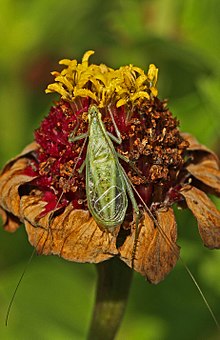
Dolbear's law states the relationship between the air temperature and the rate at which crickets chirp. It was formulated by Amos Dolbear and published in 1897 in an article called "The Cricket as a Thermometer". Dolbear's observations on the relation between chirp rate and temperature were preceded by an 1881 report by Margarette W. Brooks, although this paper went unnoticed until after Dolbear's publication.

Tree crickets are insects of the order Orthoptera. These crickets are in the subfamily Oecanthinae of the family Gryllidae.

Oecanthus is a genus of cricket in subfamily Oecanthinae, the tree crickets.

Oecanthus pellucens, common name Italian tree cricket, is a species of tree crickets belonging to the family Gryllidae, subfamily Oecanthinae.

Oecanthus fultoni, also known as the snowy tree cricket, or thermometer cricket, is a species of tree cricket from North America. It feeds on leaves but also damages fruit. The chirp of this species is often dubbed onto sound tracks of films and television shows to depict a quiet summer's night. The rate of chirp varies depending on the heat of the environment, allowing a listener to estimate the temperature.

Oecanthus nigricornis is a "common tree cricket" in the subfamily Oecanthinae. A common name for O. nigricornis is black-horned tree cricket. It is found in North America.
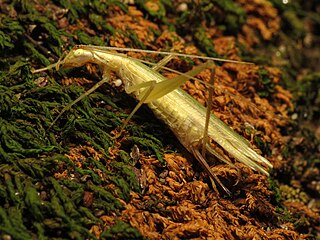
Oecanthus exclamationis is a "common tree cricket" in the subfamily Oecanthinae. A common name for O. exclamationis is Davis' tree cricket. It is found in North America.

Oecanthus latipennis is a "common tree cricket" in the subfamily Oecanthinae. A common name for O. latipennis is broad-winged tree cricket. It is found in North America.
Oecanthus varicornis, the different-horned tree cricket, is a species of tree cricket in the family Gryllidae. It was described by Francis Walker in 1869 and is found in Central and North America.

Neoscapteriscus is a genus of two-clawed mole crickets in the family Gryllotalpidae. At least 23 described species are placed in Neoscapteriscus.
Oecanthus pini, the pine tree cricket, is a species of tree cricket in the family Gryllidae. It is found in North America.
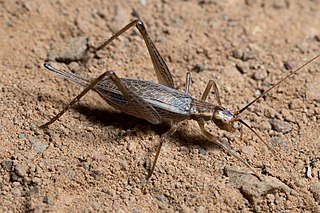
Oecanthus californicus, the western tree cricket, is a species of tree cricket in the family Gryllidae. It is found in North America.
Oecanthus celerinictus, the fast-calling tree cricket, is a species of tree cricket in the family Gryllidae. It is found in North America.
Oecanthus rileyi, known generally as the Riley's tree cricket or pine tree cricket, is a species of tree cricket in the family Gryllidae. It is found in North America.
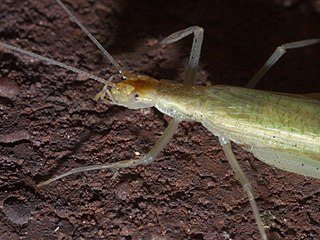
Oecanthus niveus, known generally as the narrow-winged tree cricket or snowy tree cricket, is a species of tree cricket in the family Gryllidae, which includes all crickets. First noted by Swedish Entomologist Charles de Geer in 1773 by a Pennsylvanian Specimen, it is found primarily in Eastern North America south of Canada, and also in the Caribbean.

Oecanthus forbesi, the Forbes' tree cricket, is a species of tree cricket in the family Gryllidae. It is found in North America.
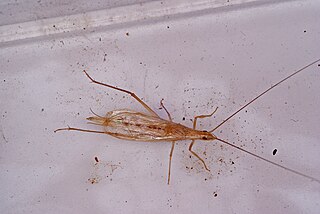
Oecanthus dulcisonans is a species of cricket sparsely but widely distributed in the Mediterranean Basin and in the Middle East.
Natasha Mhatre is a researcher in Canada at Western University whose research focuses on animal communication. Focusing on insect biomechanics, she is an assistant professor and NSERC Canada Research Chair in invertebrate neurobiology.
Oecanthus mhatreae, commonly known as the Otomí tree cricket, is a species of tree cricket in the family Gryllidae. It is found in Querétaro, Mexico. Its common name comes from the indigenous Otomi people who are native to the Mexican Plateau region, and its scientific name was given in honour of Natasha Mhatre, a noted Indian Biologist and Professor at University of Western Ontario in Canada.

